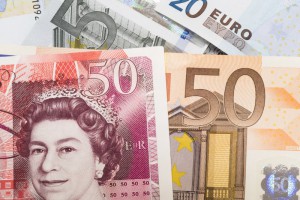Trump facing credibility issue
 The inability of a U.S. President to “carry” Congress is a major issue. This is a frequent problem when dealing with political differences but since the Republicans control both houses, it is unusual in the extreme.
The inability of a U.S. President to “carry” Congress is a major issue. This is a frequent problem when dealing with political differences but since the Republicans control both houses, it is unusual in the extreme.
Despite the three rate hikes that have been seen since December ‘16, the dollar has fallen to its lowest level since last September. Widening interest rate differentials have always been a major influence on currency movement so any pause by the Fed now could see an acceleration of dollar weakness.
Trump’s inability to secure support for his healthcare reform bill does not bode well for his ability to pass fiscal stimulus and economic reform packages. His bombastic style, making promises he is unable to keep is close to shattering his credibility.
The dollar index continues to fall which will add to inflationary pressures but further rate hikes based upon the expected economic stimulus look unlikely this year. The FOMC has pinned the need for a further hike very much upon the performance of the economy so Q2 GDP data will be critical to their plans.
Eurozone in calmer waters
 Meanwhile, in the Eurozone, where ECB President Mario Draghi has been at pains to separate a tightening of monetary policy from a rate hike, the currency has gained close to 10% this year.
Meanwhile, in the Eurozone, where ECB President Mario Draghi has been at pains to separate a tightening of monetary policy from a rate hike, the currency has gained close to 10% this year.
The ease with which the break of 1.1500 was achieved is providing traders with confidence that despite certain key resistance levels, an eventual test of 1.2000 is possible. 0.9000 is within reach now for the Eur/Gbp rate having seen a modest correction which shook out weak longs.
Tomorrow’s ECB meeting will confirm the “steady as she goes” approach. There may be some advance guidance over the withdrawal of the Asset Purchase Scheme but a rate hike is unlikely for a year or more.
Brexit has barely affected the performance of the region despite most EU members having a trade surplus with the U.K.
A lot has been made of the effect upon the U.K. economy of Brexit, but the hole in the EU’s finances from a loss of the U.K.’s budget contribution together with an inevitable fall in exports to the U.K. could have a serious effect upon certain nations, Ireland in particular.
The EU Chief negotiator Michel Barnier, sees the common border between Northern Ireland and the Irish Republic as a critical Brexit issue.
U.K. inflation falls
 In a major surprise that has brought relief to MPC doves, headline inflation fell from 2.9% in May to 2.6% in June. A lower oil price was the main contributor but it is important to view the trend of the data rather than a single outlying report. This is the opinion of BoE Governor Mark Carney, although he will no doubt be relieved that the 3% level wasn’t breached.
In a major surprise that has brought relief to MPC doves, headline inflation fell from 2.9% in May to 2.6% in June. A lower oil price was the main contributor but it is important to view the trend of the data rather than a single outlying report. This is the opinion of BoE Governor Mark Carney, although he will no doubt be relieved that the 3% level wasn’t breached.
Carney’s job at the next MPC meeting on 3rd August has been made easier now since the clamour for action over, seemingly out of control, inflation should abate somewhat. It would now be another major surprise should there be a rate hike in the next few months.
Sterling fell following the release of the data but, in a move that will concern the Bank of England, the fall had started prior to the announcement prompting whispers about a leak.
The pound managed to remain above the 1.3000 level trading down to 1.3004 but against the Euro, the move back towards 0.9000 has recommenced with yesterday’s high of 0.8904.
















